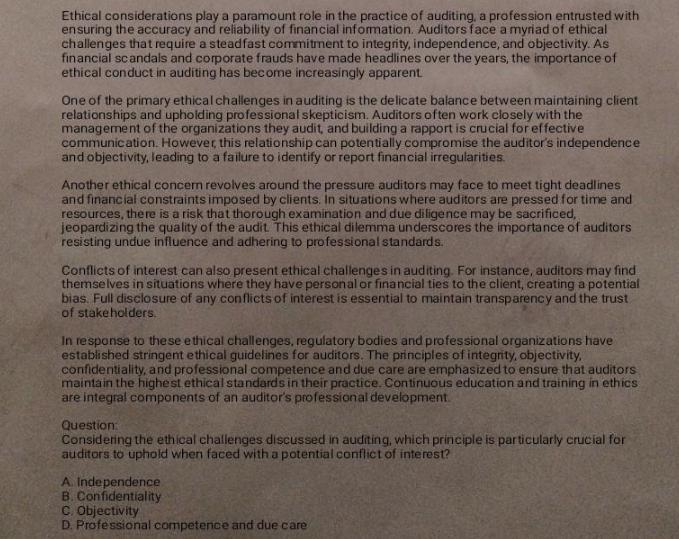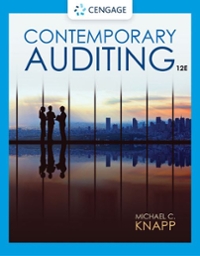Answered step by step
Verified Expert Solution
Question
1 Approved Answer
Ethical considerations play a paramount role in the practice of auditing, a profession entrusted with ensuring the accuracy and reliability of financial information. Auditors

Ethical considerations play a paramount role in the practice of auditing, a profession entrusted with ensuring the accuracy and reliability of financial information. Auditors face a myriad of ethical challenges that require a steadfast commitment to integrity, independence, and objectivity. As financial scandals and corporate frauds have made headlines over the years, the importance of ethical conduct in auditing has become increasingly apparent. One of the primary ethical challenges in auditing is the delicate balance between maintaining client relationships and upholding professional skepticism. Auditors often work closely with the management of the organizations they audit, and building a rapport is crucial for effective communication. However, this relationship can potentially compromise the auditor's independence and objectivity, leading to a failure to identify or report financial irregularities. Another ethical concern revolves around the pressure auditors may face to meet tight deadlines and financial constraints imposed by clients. In situations where auditors are pressed for time and resources, there is a risk that thorough examination and due diligence may be sacrificed, jeopardizing the quality of the audit. This ethical dilemma underscores the importance of auditors resisting undue influence and adhering to professional standards. Conflicts of interest can also present ethical challenges in auditing. For instance, auditors may find themselves in situations where they have personal or financial ties to the client, creating a potential bias Full disclosure of any conflicts of interest is essential to maintain transparency and the trust of stakeholders. In response to these ethical challenges, regulatory bodies and professional organizations have established stringent ethical guidelines for auditors. The principles of integrity, objectivity, confidentiality, and professional competence and due care are emphasized to ensure that auditors maintain the highest ethical standards in their practice. Continuous education and training in ethics are integral components of an auditor's professional development. Question: Considering the ethical challenges discussed in auditing, which principle is particularly crucial for auditors to uphold when faced with a potential conflict of interest? A. Independence B. Confidentiality C. Objectivity D. Professional competence and due care
Step by Step Solution
There are 3 Steps involved in it
Step: 1
The question provided is asking which principle is particularly crucial for ...
Get Instant Access to Expert-Tailored Solutions
See step-by-step solutions with expert insights and AI powered tools for academic success
Step: 2

Step: 3

Ace Your Homework with AI
Get the answers you need in no time with our AI-driven, step-by-step assistance
Get Started


